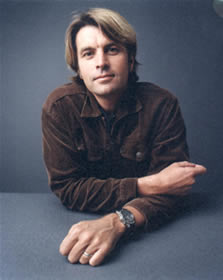 Written by Drew Pillsbury and Directed by Alan White, the film also has performances from Linda Hamilton, Tess Harper and Jake Busey. BROKEN, produced by Jerry Wayne and Brian Etting and financed by Jerry Wayne’s Walk on the Beach Productions, reveals an episode in the life of Hope, a young transplant to Los Angeles from the Midwest. We learn that after a steady stream of rejection and the sinking realization that her singing career is fast going nowhere, Hope finds solace in the arms of Will; a handsome, charming bad boy. They fall madly in love and quickly become each other’s passion, getting lost in his drug life and each other. Hope soon realizes that she is heading down a dark road. Pained, she eventually breaks it off with Will and gets a job as a waitress at an all-night diner as a first move towards pulling her life back together.
Written by Drew Pillsbury and Directed by Alan White, the film also has performances from Linda Hamilton, Tess Harper and Jake Busey. BROKEN, produced by Jerry Wayne and Brian Etting and financed by Jerry Wayne’s Walk on the Beach Productions, reveals an episode in the life of Hope, a young transplant to Los Angeles from the Midwest. We learn that after a steady stream of rejection and the sinking realization that her singing career is fast going nowhere, Hope finds solace in the arms of Will; a handsome, charming bad boy. They fall madly in love and quickly become each other’s passion, getting lost in his drug life and each other. Hope soon realizes that she is heading down a dark road. Pained, she eventually breaks it off with Will and gets a job as a waitress at an all-night diner as a first move towards pulling her life back together.
The movie unfolds while Hope is at work. Unknowingly, on this fateful night, she is confronted with myriad of temptations through seemingly innocuous situations with the patrons that she is serving. Later, we understand that she is navigating through her own version of the seven deadly sins: Sloth, Gluttony, Envy, Lust, Greed, Pride, and of course Wrath, which erupts in the form of her ex-boyfriend Will. Her dark-side incarnate comes at her from every angle this night in an all out effort to devour her soul.
Will, since Hope broke off with him, has spiraled out of control. Desperate to get Hope out of his system, he escaped to Las Vegas to try and numb his broken heart and quiet his dark thoughts. But it has not worked. We catch up with Will in a stolen car, a gun tucked in his jeans, heading back to LA, hell-bent on getting his girl back, one way or the other.
Alan White was born in London, raised and educated in Australia. A winner in Rock Australia Magazine’s Writers Contest, he began working as a freelance journalist while still at University. With degree in hand he won an Advertising Federation of Australia Graduate Scholarship and enjoyed a brief career as writing copy for Coke and Levi’s, winning a few awards and playing in various underground rock bands. An offer to direct music videos lured the copywriter/musician behind the camera.
In the next few years Alan played director by day and musician by night, directing videos for bands such as the seminal Hunters and Collectors and garage rock icons the Lime Spiders. At the time, his notorious “Homer Hudson” commercial campaign garnered him a “Who’s Hot” article in Rolling Stone, while his band, The Faith’s album was being showcased in the same issue.
Eventually the day job won out. As a director of TV commercials, including high profile campaigns for Expedia, Mitsubishi and Nike, Alan has won every major award worldwide from the Cannes Lions to the first Emmy for an outstanding commercial.
In Australia he co-founded BLACK where his work began to attract international attention. Moving to the US, Alan became a founding director of @radical.media before partnering in 2005 at the highly regarded creative shop BOB Industries.
The new millennium saw Alan direct for the big screen. Following hot on the heels of the critically acclaimed Erskineville Kings, starring Hugh Jackman, he directed Claudia Karvan and Bryan Brown to critical success in Risk which premiered at the Toronto Film Festival.
Bijan Tehrani: What inspired you to choose such a dark story for your movie? 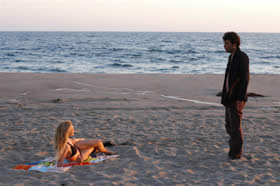
Alan White: I think a story involving addiction is something interesting to explore, and something I have experienced in my lifetime, both in my family and personally. The temptation of the dark side is something that is personal to me and I think there are powerful lessons to be learned from the violence of addictions. The film has a message, find out who you are, and be happy with who you are no matter what society says that is, no matter if you are a dishwasher or a waitress at the diner, that doesn’t make you less of a human being. Achieving success in societal terms doesn’t necessarily bring you happiness; it doesn’t get you closer to achieving your dreams anyway. In the first instance there was a personal story to be told here, and then secondarily I thought the script told that story in an interesting and challenging way; a way that asks the audience to think as they watch, which is the kind of filmmaking that I am interested in. I am also interested in purely entertaining films, but with Broken I felt that it presented a story that’s been told before but in a very innovative way. That was my main motivation for reading the script and immediately responding to it. There was a personal connection between myself and the story, which is what I need to be inspired to go on a journey and make a film.
Bijan: Is Broken an LA story about Hollywood Dreams, or in a larger scale about the American Dream, or does it goes beyond that?
Alan: Honestly I think it goes beyond that and in a sense I wanted the landscape to be non specific and the story itself to have timelessness to it. Yes, it could be an L.A. story purely because of the number of people who come to L.A. seeking to make it, seeking to achieve big dreams, however misguided the dream may be. L.A. attracts those people because it is the hub of the industry. I traveled to America, and I could have gone to another city. If you are traveling somewhere in order to achieve a dream or start a new life, or to reinvent yourself, or just purely to move on and broaden your horizons, at a certain point you are a fish out of water. It could be L.A., it could be anywhere in the world, and the truth is people have ambitions for themselves, and they go places in order seek them and sometimes those ambitions are misguided and are not truly who the person is. That then becomes their journey of self discovery as it is for Hope in Broken.
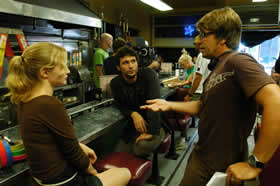 Bijan: Do you see any way out of trouble for characters of your movie like Hope?
Bijan: Do you see any way out of trouble for characters of your movie like Hope?
Alan: I do, I hope at the end of the film people feel she has found a certain peace. Thomas said to her, “I don’t know who you are running from.” Clearly she is running from herself. I feel like at the end of the movie when she is sitting on the beach you have a glimmer of hope, that you have sense of her being out of this experience and more in touch with herself, and hopefully she won’t spiral back into the addiction. Again, Thomas in many ways provides the clues for Hope. He says, “I didn’t think I’d end up wearing a fucking hairnet, but hey here I am.” It’s finding a peace within yourself, with all your flaws, and not putting so much of your hope on being successful in Hollywood terms, or successful in societal terms. You have got to find a peace with yourself no matter what your success or lack of it, you have to be comfortable in your own skin. I see that Hope on the beach is feeling that she has turned a corner. It’s not explicit, but there is a feeling that she, at the very least, has survived to live another day.
Bijan: Both of your past movies Erskineville Kings and Risk deals with the dark side of human life, is this the rout you will take in your future movies also? 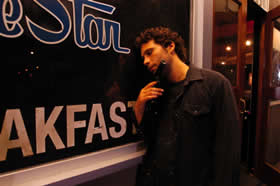
Alan: The thing to me is, whether a movie is pure entertainment or more significant drama, I think they have to be stories with a truth in them, and there can be truth in entertaining movies and they can be well told. I feel like I have spent enough time in the dark side and I would like to explore a lighter world, a more uplifting world, a more—not an idealized world, but certainly tell a story of romance, tell a story of passion. In the same way that addiction is an interesting behavior to study and to be intrigued by, so is heightened emotion, so is romance for instance; so are the things that make us laugh and the situations we get into. To me, I like there to be a really good psychological journey within a film but honestly it could be within a comedy and certainly you can find those within drama. Personally I feel ready to laugh a little bit more with the world.
Bijan: Has making commercials and music videos helped you in making your feature films?
Alan: The majority of the commercials I have made are very funny but I have always used the same internal guide in making those commercials, as in making the more intense dramas, always asking, “How would this be if this was for real?” It’s always been my guiding parameter. It’s always been kind of taking the ordinary experiences in life and making them extraordinary. I now have an interest in taking that experience from 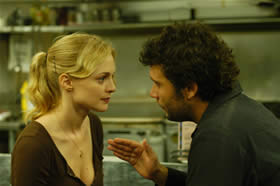 commercials into the picture world. Conversely when I started my feature career I was attracted to the darker elements because it was something new for me. Most commercials are an optimistic tale telling you how good something is or getting you to laugh or become emotionally attached to something in a positive way. And so, when I had the opportunity to make my first film, I gravitated, and probably because of the stage and where I was at as a person as well, I definitely gravitated toward the dark side because I hadn’t explored it in film. In technical terms it has been an amazing film school. I have learned that there are no rules, in many ways. It is interesting because the way I approached “Broken”, I cut more in a style that I would cut a commercial. Along the way there were people who said, “Do you think you should be cutting to the wide shot at this point?” The film language within commercials uses size in a much more dramatic way to tell a story. If you were to cut after a wide shot in the middle of a conversation in a film edit, it would destroy the flow of it. I found that later you could break that rule as well. I think there is a sense of getting into a film in the first ten to fifteen minutes where you establish a rhythm of an edit, that the audience then starts to feel comfortable with. As long as your film obeys its own rules the whole way through, it can be successful. That is what I felt I learned through the whole “Broken” experience, and I was keen to explore that. Psychologically in commercials, you are so often doing things you wouldn’t choose to do, and you are faced with stories that if you were to sit down and write a story, you wouldn’t write that story, and I think that makes you a more rounded director, forcing you out of your comfort zone. You are often dealing with things that are quite technically challenging, and obviously the opportunities to put any film through a camera and work with actors makes you a better director. It has been really good for me. They are very different mediums in many ways but in technical terms, I believe one can support another and one can inform another.
commercials into the picture world. Conversely when I started my feature career I was attracted to the darker elements because it was something new for me. Most commercials are an optimistic tale telling you how good something is or getting you to laugh or become emotionally attached to something in a positive way. And so, when I had the opportunity to make my first film, I gravitated, and probably because of the stage and where I was at as a person as well, I definitely gravitated toward the dark side because I hadn’t explored it in film. In technical terms it has been an amazing film school. I have learned that there are no rules, in many ways. It is interesting because the way I approached “Broken”, I cut more in a style that I would cut a commercial. Along the way there were people who said, “Do you think you should be cutting to the wide shot at this point?” The film language within commercials uses size in a much more dramatic way to tell a story. If you were to cut after a wide shot in the middle of a conversation in a film edit, it would destroy the flow of it. I found that later you could break that rule as well. I think there is a sense of getting into a film in the first ten to fifteen minutes where you establish a rhythm of an edit, that the audience then starts to feel comfortable with. As long as your film obeys its own rules the whole way through, it can be successful. That is what I felt I learned through the whole “Broken” experience, and I was keen to explore that. Psychologically in commercials, you are so often doing things you wouldn’t choose to do, and you are faced with stories that if you were to sit down and write a story, you wouldn’t write that story, and I think that makes you a more rounded director, forcing you out of your comfort zone. You are often dealing with things that are quite technically challenging, and obviously the opportunities to put any film through a camera and work with actors makes you a better director. It has been really good for me. They are very different mediums in many ways but in technical terms, I believe one can support another and one can inform another.
Bijan: A film critic who has seen your previous two movies says that you are Luis Bunuel of our time, as you are a great analyzer of human unknown side.
Alan: (laughs) I mean, I’m flattered that someone would see that and say that. As a person I have always felt like a little bit of an outsider, and I was very shy as a child. I think that is why I got into the darker side myself; in order to overcome my shyness and to try and enjoy a more social world. Ultimately I had to overcome my addiction and get in touch with my true self, which is to sit back and observe. Whatever those observations you make are, they exist only within your own head. As a younger person you think, “Well everyone makes these observations, don’t they?” Then when as a director you question your right to tell a story to everyone else, you ask yourself, “What do I have to say?” and “What do I have to say that is different from what everyone else has to say?” One day I realized that my view of the world is a very personal one and one that a select audience would find interesting. So, I mean, that’s very flattering (laughs). It’s nice to hear that.
Bijan: Could you tell us about your future projects? 
Alan: Yeah, I have another personal story; it’s a script I am writing. It is called Connecticut. It is a right-of-passage story about a young man about to enter the world—he has just finished college, and he comes in direct conflict with his parents’ ambitions for him. Through the journey he goes on, he realizes what he wants to do, what story he wants to tell, and how he wants to live his life. It is a pretty funny story; I have deliberately decided to tackle it in a lighter way. It’s The Graduate meets Festen. It has got its darker elements but it is a story that I’m keen to tell. I also have a number of other projects I am involved in. I have a thriller called The Ride, which would be an Australian movie. It starts off with a really disturbing event where a young man is forced to hitch a lift with an older guy and that guy kills someone standing by the side of the road; that’s how the movie begins. It calls into question the class and racist divide that is presently within Australia. I also have a heist movie that I have been developing called Days Like This, which we call “Dog Day Afternoon” on acid. It is about two gangs of robbers hitting the same bank at exactly the same time, and hijinks ensue. I am currently developing a television series for the Independent Film Channel which is very, definitely lighter. You know, I am always just sort of looking for really good ideas that I have a personal connection with. That is the only thing that keeps me going, and the only thing that is true to any project. It is like you with your films, you don’t know what journey they will go on and where the story will end up. The film you think you will make next, you don’t end up making. In fact, after Risk I was going to make a romantic comedy–American Woman–and it was almost going to happen and then it didn’t, so my life changed and a dark story fell out of the sky again. It’s funny what mountain you end up climbing, whether it’s cloudy up top or whether it’s sunny.
Bijan: it was great talking to you Alan.

